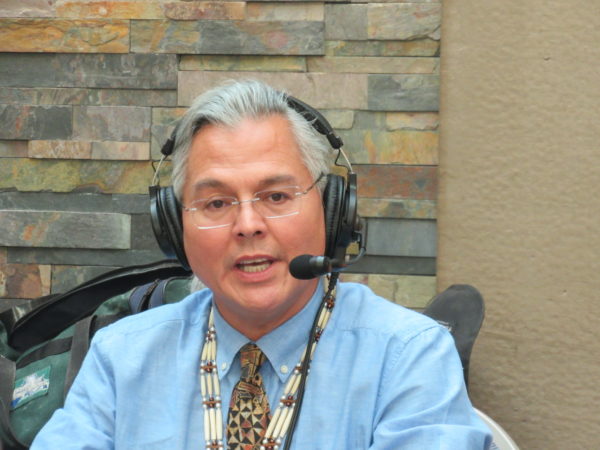
- Details
- By Levi Rickert
SAULT STE. MARIE, Mich. - Aaron Payment, the chairperson of the Sault Ste. Marie Tribe of Chippewa Indians, announced his decision to seek reelection on Saturday, Feb. 8. Based in Sault Ste. Marie, Michigan, the Sault Ste. Marie Tribe is the largest populated tribal nation east of the Mississippi River.
In addition to being chairperson of his Tribe, Payment was reelected first vice president of the National Congress of American Indians, the oldest, largest and most representative American Indian and Alaska Native tribal government organization in the country,
“The role of chairperson in representing my Tribe at all levels is important. I have worked hard to build our standing as a tribal nation at the highest levels for the benefits of our Tribe and for all Indian people,” stated Payment in a press release.
Payment also serves as chair of the Inter-Tribal Council of Michigan; president of the United Tribes of Michigan; president of the Midwest Alliance of Sovereign Tribes and as co-chair of the National Advisory Council on Indian Education.
In seeking another term, Payment says he wants to run on a platform that includes increasing services for Sault Ste. Marie tribal citizens and mitigating weighty issues such as being the lead negotiator for his Tribe’s 2020 Great Lakes Fishing Treaty Consent Decree.
“I absolutely love representing, advocating and fighting for my people and hope Sault Tribe voters will give me the opportunity to finish the work we started,” Payment said.
Payment has been involved with his Tribal government since 1996 when he was first elected to the tribal council. He then served two terms as vice chairperson. He served for one term as chairperson beginning in 2004. In 2012, he was elected again as chairperson in 2012 and reelected in 2016.
More Stories Like This
Native News Weekly (August 25, 2024): D.C. BriefsUS Presidents in Their Own Words Concerning American Indians
Ethics Complaint Alleges Former Navajo Nation Chief of Staff Accepted Gifts From Contractor
Monday Morning (December 14, 2025): Articles You May Have Missed This Past Weekend
Senators Demand Accountability Amid Reports of ICE Questioning Native Americans
Help us defend tribal sovereignty.
At Native News Online, our mission is rooted in telling the stories that strengthen sovereignty and uplift Indigenous voices — not just at year’s end, but every single day.
Because of your generosity last year, we were able to keep our reporters on the ground in tribal communities, at national gatherings and in the halls of Congress — covering the issues that matter most to Indian Country: sovereignty, culture, education, health and economic opportunity.
That support sustained us through a tough year in 2025. Now, as we look to the year ahead, we need your help right now to ensure warrior journalism remains strong — reporting that defends tribal sovereignty, amplifies Native truth, and holds power accountable.
 The stakes couldn't be higher. Your support keeps Native voices heard, Native stories told and Native sovereignty defended.
The stakes couldn't be higher. Your support keeps Native voices heard, Native stories told and Native sovereignty defended.
Stand with Warrior Journalism today.
Levi Rickert (Potawatomi), Editor & Publisher

